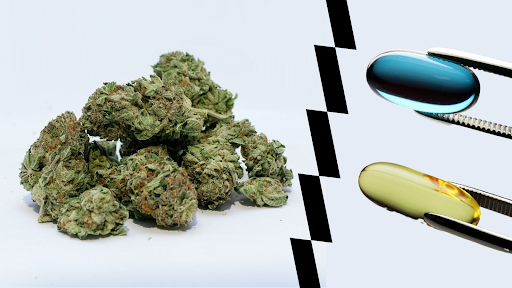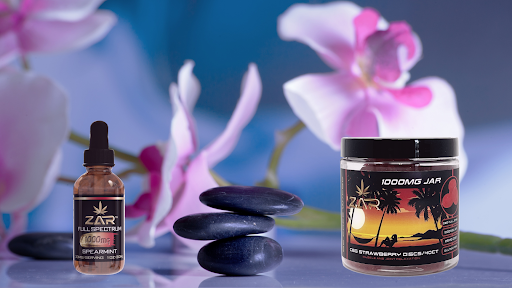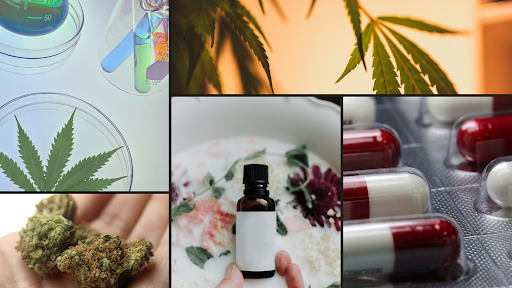Benefits of Exploring Plant-Based Medicine
|
| Medicinal Path | Benefits | Shortcomings |
|---|---|---|
Plant-Based Medicine, Hemp Products |
- Natural Holistic Healing - Non-addictive - Offers a wide array of health benefits, ranging from pain mitigation to mood stabilization - Limited & mild side effects - Derived from plants - Affect the endocannabinoid system |
- Limited (but growing!) research base - Can be difficult to access (but made easy with ZAR online store) |
| Pharmaceuticals | - Extensively researched - Highly targeted care - Widely available (with adequate access to healthcare) |
- Price - Often require a prescription to access benefits - May be artificial - Side effects can range from mild to debilitating |
For one, hemp products are plant-based options that derive their wellness-inducing properties from the cannabis sativa plant. While there are a few prescription medications that also make use of the cannabis sativa plant or other plants, many prescription medications are entirely synthetic. Additionally, plant-based medicine is typically not regulated by the FDA, but pharmaceuticals certainly are.
Either can vary in its efficacy for treating a given symptom, but one thing is for sure; cannabis products can help to fill the gaps left by traditional pharmaceuticals. ZAR products are composed of natural, plant-based healing that’s sourced from cannabis plants, plants that have proven to have a variety of beneficial health effects. Pharmaceuticals can also be host to plenty of beneficial health effects, but there’s no denying they often come with significant side effects and often require close monitoring. For example, cannabis products are frequently used in conjunction with cancer treatment to ease the side effects of chemotherapy, and cannabis compounds have even been shown to have some anti-carcinogenic effects. So while neither is a direct replacement for one another, there are situations where one may be a better option for you, and there are also situations where they can work perfectly together.
Is cannabis as good as medicine?
In some contexts, cannabis can be the best medicine. This, of course, depends on what it is being used for. If you’re considering the use of hemp products for your own wellness, we offer plenty of resources to learn more about what hemp can do for you, including a guide on choosing the right CBD, a guide on what CBD does, and other frequently asked questions. Knowing if cannatherapy is as good as medicine for your needs comes down to being educated on its capabilities, and our cannatherapy experts have devoted their livelihoods to knowing what it can do for you. Speak with one of us by scheduling your free cannatherapy consultation to learn more about our plant-based hemp products and get set up with the relief you’re looking for.
Why Isn’t Cannabis Used More Often Instead Of Pharmaceuticals?
A big reason cannabis isn’t more prominent in the healthcare industry is largely tied to the stigma that was built around it over its history in the US. Cannabis and hemp have been the topic of much legislation over the past few years, and we’ve luckily seen a fair amount of that legislature opening up opportunities for cannabis and hemp products to be better researched and more available for those who can benefit from them. While cannabis has been known to have beneficial effects for quite a while, the extent to which cannabis can help and the variety of applications in which it helps are continually being researched and grown upon. However, that research wasn’t always as easy to conduct.
Prior to the Farm Bill of 2018, hemp was listed under marijuana in the Controlled Substances Act (CSA), making it a schedule 1 drug according to the Drug Enforcement Administration (DEA). That meant that growers and researchers needed to be registered with the DEA to legally manufacture and research hemp products, and without getting too far into it, we’ll just say being federally authorized to do so wasn’t particularly easy for such a restricted substance. Growing and researching cannabis plants was then extremely difficult and expensive to do legally. But, since the Farm Bill of 2018 removed Hemp (defined as cannabis with less than 0.3% delta 9 THC content) from the CSA, registration with the DEA is no longer required to grow or research hemp. Keep in mind, that bill was passed in 2018, making it still relatively recent legislation. More and more research is now coming out to clinically prove the applicability of cannabis to benefit wellness, and ZAR is proud to be your one-stop shop to conduct research of your own on how cannatherapy can benefit you.
Prior to the Farm Bill of 2018, hemp was listed under marijuana in the Controlled Substances Act (CSA), making it a schedule 1 drug according to the Drug Enforcement Administration (DEA). That meant that growers and researchers needed to be registered with the DEA to legally manufacture and research hemp products, and without getting too far into it, we’ll just say being federally authorized to do so wasn’t particularly easy for such a restricted substance. Growing and researching cannabis plants was then extremely difficult and expensive to do legally. But, since the Farm Bill of 2018 removed Hemp (defined as cannabis with less than 0.3% delta 9 THC content) from the CSA, registration with the DEA is no longer required to grow or research hemp. Keep in mind, that bill was passed in 2018, making it still relatively recent legislation. More and more research is now coming out to clinically prove the applicability of cannabis to benefit wellness, and ZAR is proud to be your one-stop shop to conduct research of your own on how cannatherapy can benefit you.
Should I Choose Plant-Based Medicine or Pharmaceuticals?
The beauty of plant-based medicines is that they often offer you a great deal of flexibility. If you try out hemp products and find they don’t provide the relief you’re looking for, you’re always free to try traditional pharmaceuticals. However, we’re confident in the wellness-facilitating capabilities of hemp products, so speak with us to see what we can offer to manage your ailments
Can Plant-Based Medicines Replace Traditional Pharmaceuticals?
We’re not here to claim that cannatherapy products are an outright replacement for all pharmaceuticals; that’s simply not the case. They are, however, a great alternative or supplement for those looking to mitigate the harsh side effects that often come from pharmaceuticals and those searching for more natural, holistic healing. If you have pre-existing conditions for which you have been prescribed medications, do speak with your doctor before including cannatherapy in your healing regimen, but don’t rule out cannatherapy before seeing what it can do for you. Book a free consultation with one of ZAR’s cannatherapy experts today and let’s build a wellness regimen together.
0 Comments







